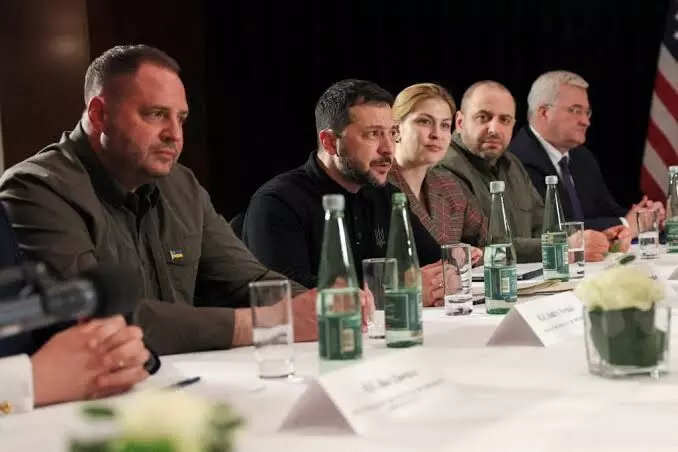European leaders want say in talks to end Russia's war in Ukraine; US is brushing them off

Paris: European leaders insisted on Monday their governments must have a say in talks between the US and Russia to end the war in Ukraine, as both Moscow and Washington said there was no role for Europe in the negotiations that could shape the future of the continent.
Leaders of Germany, the UK, Italy, Poland, Spain, the Netherlands, Denmark, NATO and the European Union met for over three hours at the Elysee Palace in Paris for emergency talks on Europe's security quandary after a US diplomatic blitz on Ukraine which has thrown a once-solid alliance into turmoil.
UK Prime Minister Keir Starmer called for US backing while reaffirming he's ready to consider sending British forces on the Ukrainian ground alongside others "if there is a lasting peace agreement".
"There must be a US backstop, because a US security guarantee is the only way to effectively deter Russia from attacking Ukraine again," Starmer said after the meeting. Many EU nations are still undecided about whether to send troops while some are opposed.
Top US officials from the Trump administration, on their first visit to Europe last week, left the impression that Washington was ready to embrace the Kremlin while it cold-shouldered many of its age-old European allies.
Gen Keith Kellogg, Trump's special envoy for Ukraine and Russia, said he didn't think it was "reasonable and feasible to have everybody sitting at the table".
"We know how that can turn out and that has been our point, is keeping it clean and fast as we can," he told reporters in Brussels, where he briefed the 31 US allies in NATO, along with EU officials, before heading to Kyiv for talks on Wednesday with Ukrainian President Volodymyr Zelenskyy.
His remarks were echoed by Russian Foreign Minister Sergei Lavrov, who was equally dismissive about a role for Europe.
Last week, Vice-President JD Vance and Defense Secretary Pete Hegseth in a flurry of speeches questioned both Europe's security commitments and its fundamental democratic principles.
French President Emmanuel Macron, who has long championed a stronger European defence, said their stinging rebukes and threats of non-cooperation in the face of military danger felt like a shock to the system.
The tipping point came when Trump decided to upend years of US policy by holding talks with Russian President Vladimir Putin in hopes of ending the Russia-Ukraine war.
Shortly before the meeting in Paris, Macron spoke with Trump, but Macron's office would not disclose details about the 20-minute discussion.
Starmer, who said he will travel to Washington next week to discuss with Trump "what we see as the key elements of a lasting peace", appears to be charting a "third way" in Europe's shifting geopolitical landscape -- aligning strategically with the US administration while maintaining EU ties.
German Chancellor Olaf Scholz, who left the meeting before it had finished, told reporters a possible peace agreement with Russia cannot be forced on Ukraine from outside.
Spanish Prime Minister Pedro Sanchez said that any peace agreement would need to have the active involvement of the EU and Ukraine, so as to not be a false end to the war "as has happened in the past".
"Negotiations are moving fast with Europe," Zelenskyy said in a virtual news conference on Monday in Kyiv, adding recent US moves "accelerated everything".
Zelenskyy said Macron had agreed to provide him with a briefing on the conclusions from the meeting in Paris.
A strong US component, though, will remain essential for the foreseeable future since it will take many years before European nations can ratchet up defence production and integrate it into an effective force.
"A ceasefire must not lead to Russian rearmament, which is followed by new Russian attacks," warned Danish Prime Minister Mette Frederiksen ahead of the Paris meeting.
Yet Scholz said talk of boots on the ground was "premature".
"This is highly inappropriate, to put it bluntly, and honestly: we don't even know what the outcome will be," he added.
News agency ANSA said Italian Premier Georgia Meloni reportedly described the option of sending troops as "the most complex and the least effective" during the meeting.
European nations are bent on boosting Ukraine where they can, and most have committed to increase defence spending to 2 per cent of gross domestic product, but the path to reaching 3 per cent is unclear.
"The time has come for a much greater ability of Europe to defend itself," Poland's Prime Minister Donald Tusk said after the meeting.
Poland spends more than 4 per cent of its GDP on defence, more than any other NATO member.
Some of the EU nations balked at the thought of the restrictive Elysee meeting with only a few chosen leaders while others were left in the cold. For an uncomfortable number of decisions, the EU needs the backing of all 27 nations. Hungarian Prime Minister Viktor Orban, a staunch ally of Russian President Vladimir Putin, has already threatened to use his veto on a number of occasions.
Slovenian President Natasa Pirc Musar said the selective list of invitees was proof that the EU member states are not treated equally.
Slovakia's populist Prime Minister Robert Fico questioned the presence of top EU representatives at the meeting, noting that the EU has no right to decide about any deployment of foreign troops in a country.



